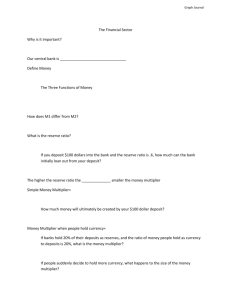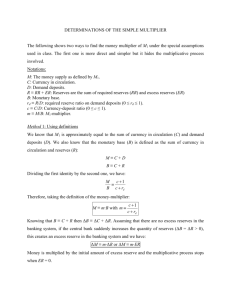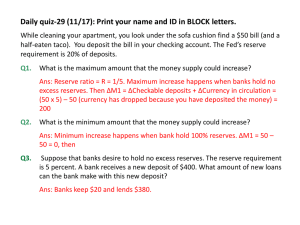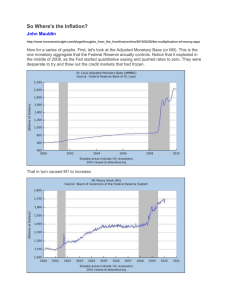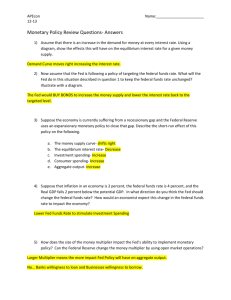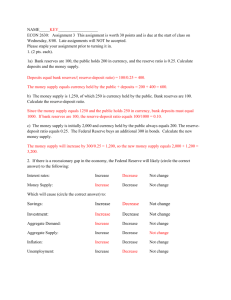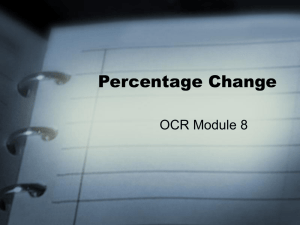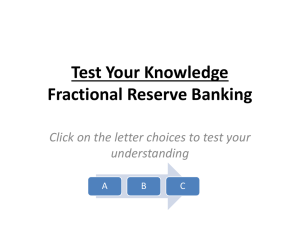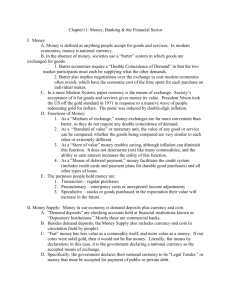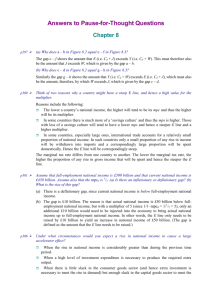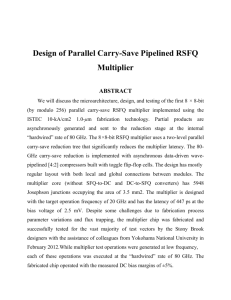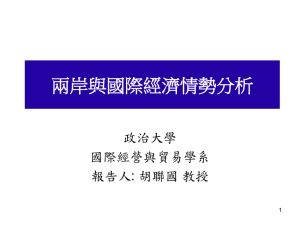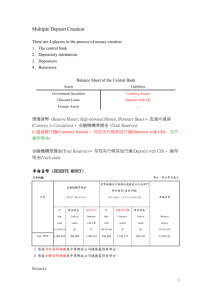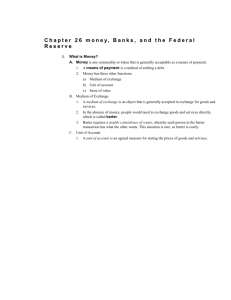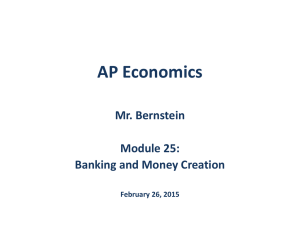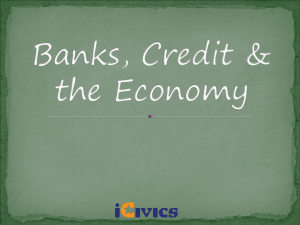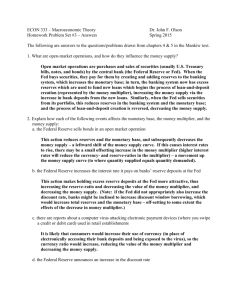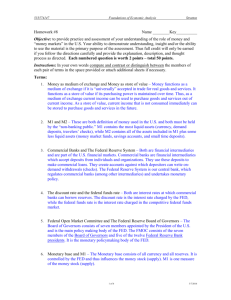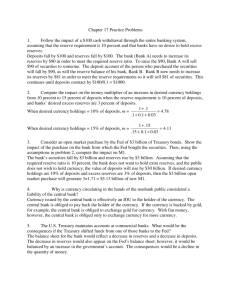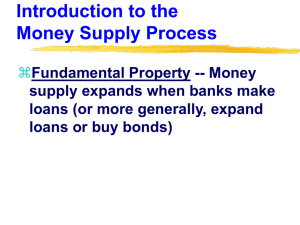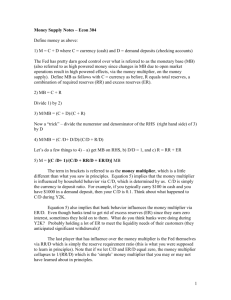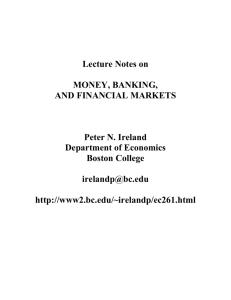Chapter 14 Homework Solutions
advertisement
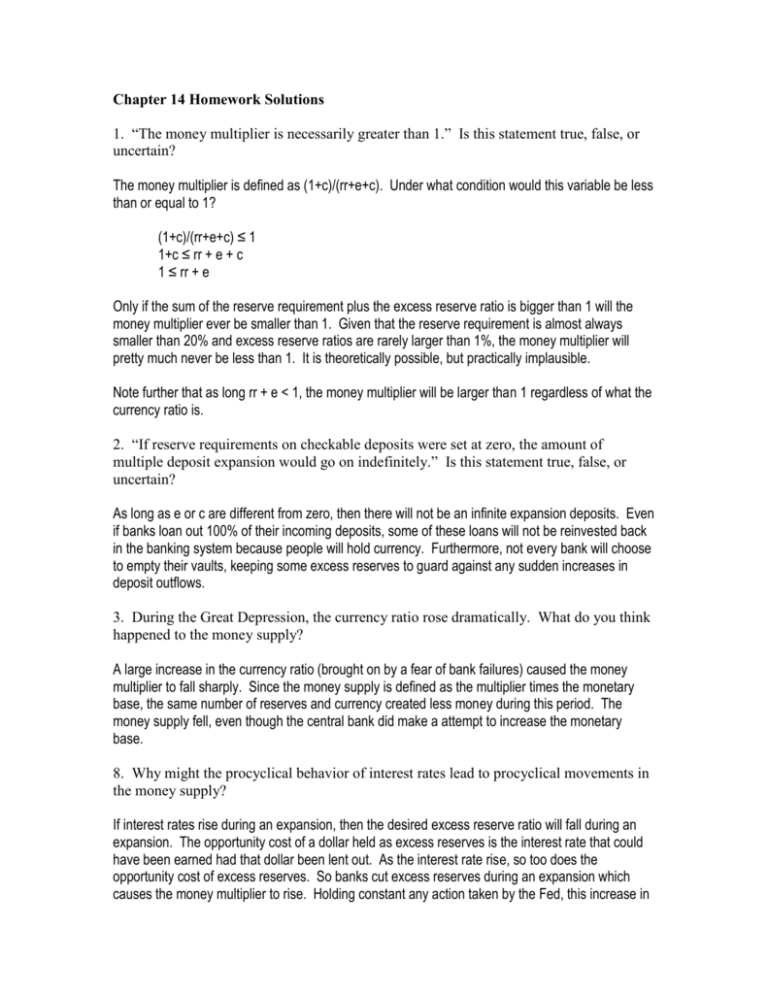
Chapter 14 Homework Solutions 1. “The money multiplier is necessarily greater than 1.” Is this statement true, false, or uncertain? The money multiplier is defined as (1+c)/(rr+e+c). Under what condition would this variable be less than or equal to 1? (1+c)/(rr+e+c) ≤ 1 1+c ≤ rr + e + c 1 ≤ rr + e Only if the sum of the reserve requirement plus the excess reserve ratio is bigger than 1 will the money multiplier ever be smaller than 1. Given that the reserve requirement is almost always smaller than 20% and excess reserve ratios are rarely larger than 1%, the money multiplier will pretty much never be less than 1. It is theoretically possible, but practically implausible. Note further that as long rr + e < 1, the money multiplier will be larger than 1 regardless of what the currency ratio is. 2. “If reserve requirements on checkable deposits were set at zero, the amount of multiple deposit expansion would go on indefinitely.” Is this statement true, false, or uncertain? As long as e or c are different from zero, then there will not be an infinite expansion deposits. Even if banks loan out 100% of their incoming deposits, some of these loans will not be reinvested back in the banking system because people will hold currency. Furthermore, not every bank will choose to empty their vaults, keeping some excess reserves to guard against any sudden increases in deposit outflows. 3. During the Great Depression, the currency ratio rose dramatically. What do you think happened to the money supply? A large increase in the currency ratio (brought on by a fear of bank failures) caused the money multiplier to fall sharply. Since the money supply is defined as the multiplier times the monetary base, the same number of reserves and currency created less money during this period. The money supply fell, even though the central bank did make a attempt to increase the monetary base. 8. Why might the procyclical behavior of interest rates lead to procyclical movements in the money supply? If interest rates rise during an expansion, then the desired excess reserve ratio will fall during an expansion. The opportunity cost of a dollar held as excess reserves is the interest rate that could have been earned had that dollar been lent out. As the interest rate rise, so too does the opportunity cost of excess reserves. So banks cut excess reserves during an expansion which causes the money multiplier to rise. Holding constant any action taken by the Fed, this increase in the money multiplier will lead to an increase in the money supply. The exact opposite thing happens during a recession where lower interest rates reduce the opportunity cost of excess reserves. Banks increase e and the money multiplier falls. 9. The Fed buys $100 million of bonds from the public and also lowers rr. What will happen to the money supply? The $100 million purchase of bonds will increase the monetary base, leading to an increase in the money supply. Lowering the reserve requirement causes the money multiplier to rise, leading to an increase in the money supply. 10. The Fed has been discussing the possibility of paying interest on excess reserves. If this occurred, what would happen to the excess reserve ratio (e)? This decision would reduce the main cost of holding excess reserves, the foregone interest that could have been earned on loans. This policy would cause the excess reserve ratio to rise and lead to a decrease in the money multiplier and money supply. 14. If the economy starts to boom and loan demand picks up, what do you predict will happen to the money supply? An increase in loan demand will cause the market interest rate to rise. Higher interest rates will cause banks to reduce their excess reserves, leading to a decrease in e. A lower excess reserve ratio suggests a larger money multiplier and an increase in the money supply.
